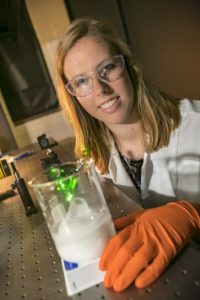
Taylor Payne will be showing off her student research during Posters on the Hill in Washington D.C. later this month.
Every year, 60 students present their undergraduate research on Capitol Hill in Washington, DC. This year, UT junior Taylor Payne will be among them as she presents her research project Neurological Disease Detection Using Laser Technology.
Posters on the Hill is a national conference that will take place April 17–18. The conference allows lawmakers to see college students from all over the country present their research projects.
Payne is the fourth UT student in the past four years to have a project accepted for Posters on the Hill. She is one of more than 2,000 UT undergraduates who participated in research and creative activities during the past year. That number increases every year, due in part to an increasing number of initiatives available to students.
While in Washington, Payne and her faculty mentor, Bhavya Sharma, an assistant professor of chemistry, will meet with US Representative Phil Roe, as well as the staff of US Senators Lamar Alexander and Bob Corker.
Payne, of Johnson City, Tennessee, is majoring in chemistry and Hispanic studies.
“I’ve been working on this project for two years now,” Payne said, explaining that Sharma’s lab is working on developing a noninvasive method of detecting neurological disease using a laser light scattering technique to monitor concentrations of neurochemicals in the brain.
In addition to working 20 hours a week in a research lab, Payne volunteers at Fort Sanders Regional Medical Center. During the summer, she works as a teaching assistant and a resident assistant for the Governor’s School for the Sciences and Engineering.
“Taylor is representative of the caliber of undergraduate research performed at UT,” said Victor McCrary, vice chancellor for research. “She, and students like her, will lead the next wave of innovation in health care technology and disease prevention. Presenting this knowledge to our nation’s legislators will help to emphasize the importance of continuing support for academic research.”
Payne said her undergraduate research experience has helped guide her career plans.
“Working with Dr. Sharma’s group has made me realize I have a passion for medical research,” she said.